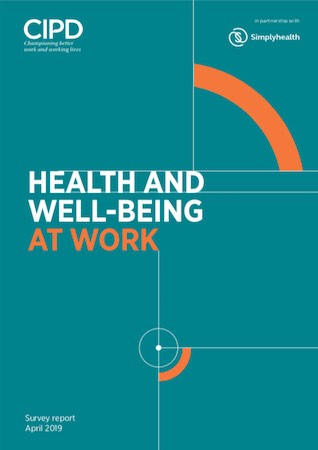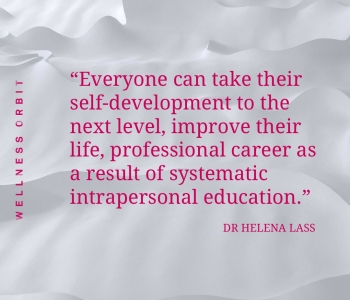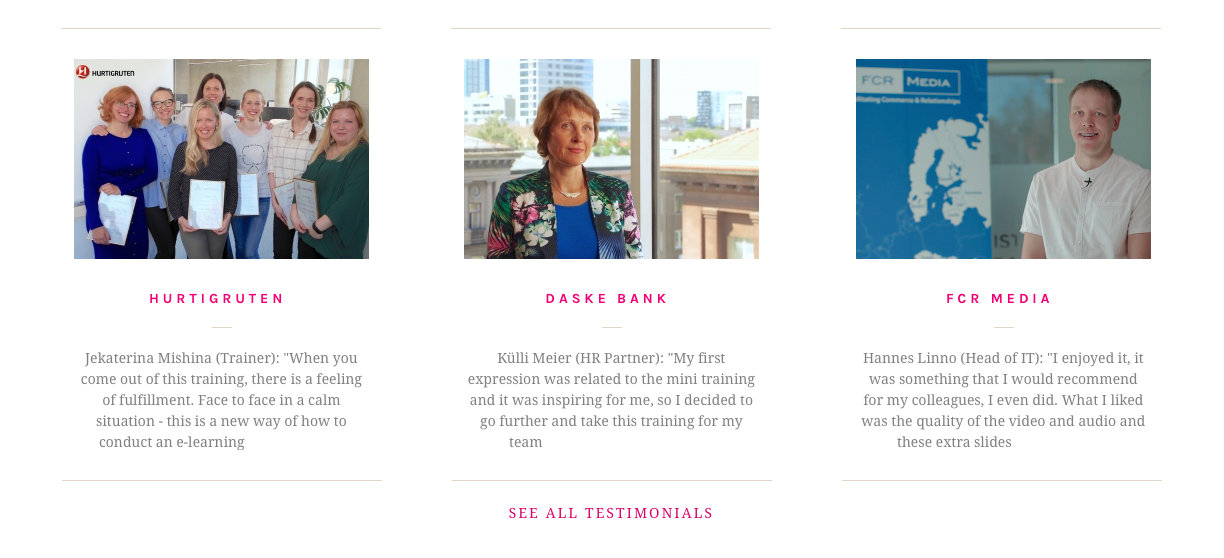How to prevent stress and burnout in the workplace?
As you are aware, April was Stress Awareness Month in the UK.
What did you change in your life? What did your employees obtain in new skills for preventing stress and burnout?
Last year's Health and Safety Executive reported1 that "stress, depression or anxiety accounted for 57% of all working days lost due to ill health" in the United Kingdom. Some other studies provide even worse numbers, so it is clear that we need a change in all workplaces where people face pressure and stressful situations.
WHAT IS STRESS?
Stress can be defined as the adverse inner reaction that people experience when they come into contact with excessive pressures that they fail to handle. When there is too much outside pressure, our own inadequate inner reactions can easily cause us emotional and mental overload.
Do your employees know:
- How to manage stressful situations and related inner reactions?
- What health problems can stress lead to if we lack the intrapersonal skills to deal with stress?
- Why even positive stress isn't a good thing?
- What is burnout, and how to spot the early warning signs?
- How can you replace your automatic reactions with a more adequate response?
- What kind of practical steps to take to prevent work-related mental health problems before they turn into serious illnesses?
HOW TO DEAL WITH STRESS AT WORK?
The short answer is, by learning intrapersonal skills that allow us to reduce our own inner reactivity. However, a longer explanation is needed to reduce stress in real work situations.
Until people lack intrapersonal skills, stress will continue to create overwhelming situations that can cause severe physical and mental health problems, affecting the quality of our personal and work relations.
If you have followed our newsletters and blog posts, then you know that the root causes of most work-related mental health problems are stress and employee burnout.
STRESS AND BURNOUT SHOULD BE STIGMA-FREE TOPICS
Stress and burnout aren't mental illnesses, but both are mental health-related problems that can easily escalate into mental illnesses.
Stress, burnout, anxiety, and depression can also increase the risk of cardiovascular diseases, muscle tension, gastrointestinal illnesses, obesity or bad skin conditions, etc. Mental wellness and physical fitness are directly interconnected.
Stress is the lifestyle choice of successful professionals and managers – when you work well, you come into contact with (work-related) stress on a daily basis. Entrepreneurs, managers and all high-performing employees have chosen to put themselves on the frontline for the success of your organization.
They are often the ones who fall into the trap of increasing stress levels as they lack intrapersonal education. It’s not their fault that our education system has totally neglected mental wellness or offered mental fitness lessons about their inner domain and how to lead it.
STRESS IS THE MAIN CAUSE OF BURNOUT
Different scientific studies have proven time and time again that burnout isn’t the result of one single event, but rather a question of lifestyle choices and long-term exposure to stress.
People do well if they have intrapersonal skills to handle inner turmoil. If they lack intrapersonal skills, they fall into the trap of not being able to deal with their own inner processes and sooner or later face a downward spiral.
The fact that stress is the main cause of burnout is well known; what is less known is that positive stress is a much bigger problem than negative stress.
Burnout doesn’t just happen overnight; it has five distinctive phases, and that makes it possible to prevent burnout at work.
We open up and explain each phase of burnout in detail in our e-training 'Performing Under Pressure'. The problem is that people fail to see the early warning signs. It is up to you, as HR/employer/entrepreneur/ to change that.
Once you and your employees are able to spot the warning signs of burnout, it becomes possible to prevent it. Intrapersonal education enables you to learn about your inner domain, enabling you to deal with all of the stressful situations and pressures you might face in life.
WHY DOES PREVENTING BURNOUT MATTER FOR EMPLOYERS?
If we look at it from an employer's standpoint, then stress and burnout can affect the health of staff, lead to sick leaves, absenteeism, reduce productivity and work engagement, and lead to other performance, quality and client relationship issues. Yet many employers do nothing and lack a proactive approach towards mental fitness.

 The CIPD Survey Report ‘Health and Wellbeing at Work’ from last month2 stated “Despite the increased focus on mental health, for example, there is still a lack of preventative measures being taken and despite employers’ efforts, we are still seeing a worrying increase in poor mental health and work-related stress. This indicates that the steps taken by employers are falling short of what’s needed. Overall, organisations still tend to take a reactive approach to well-being, rather than a pre-emptive one that aims to create the kind of working environment that supports good well-being and helps to prevent poor health where possible.” It is the proactive/preventative mental wellness approach that distinguishes Wellness Orbit from everyone else offering any kind of mental health training.
The CIPD Survey Report ‘Health and Wellbeing at Work’ from last month2 stated “Despite the increased focus on mental health, for example, there is still a lack of preventative measures being taken and despite employers’ efforts, we are still seeing a worrying increase in poor mental health and work-related stress. This indicates that the steps taken by employers are falling short of what’s needed. Overall, organisations still tend to take a reactive approach to well-being, rather than a pre-emptive one that aims to create the kind of working environment that supports good well-being and helps to prevent poor health where possible.” It is the proactive/preventative mental wellness approach that distinguishes Wellness Orbit from everyone else offering any kind of mental health training.
As we look for ways to reduce the stigma surrounding mental illness and mental health problems in our workplace, the approach needs to be comprehensive and proactive, as there is no stigma attached to mental wellness.
It’s important that employees feel comfortable talking about their mental health at work. Talking about mental wellness and mental fitness matters as much as daring to address any mental health problems very early on.
INTRAPERSONAL EDUCATION BRINGS PERSONAL SUSTAINABILITY
When it comes to reducing stress, instead of having a campaign-style ‘do it once’ and forget mentality, we should strive for sustainable solutions that are always here when you and your employees need them the most.
Why does systematic intrapersonal education matter?
Improving intrapersonal intelligence enables employees, employers, and HR teams to use the right terms and really have meaningful conversations around stress reduction and keeping their bright mind(s) well. Those conversations build trust and also enable your staff to seek help at the earliest opportunity when warning signs appear.
The truth here is plain and simple: the more proactive the approach, the better your organizational culture and work results will be. The more reactive your approach (even mental health first aid is the reactive approach), the more problems you face.
Every employer needs to know:
- Until people possess intrapersonal education, mental health problems will occur, as people have had no intrapersonal training in schools.
- Organization-wide proactive approaches have a much better ROI than even an early reactive approach (mental health first aid). On the other hand, a lack of any such measures sooner or later causes your organization loss and damage (toxic workplaces, bad customer relations, loss of employees, actual business loss, etc).
- Training intrapersonal skills before employees experience serious stress or burnout is the best business plan, as top performers are the first you will lose to (mental) health problems.
- How to spot when a staff member may be experiencing stress or burnout or other mental health problems.
ACCESS TO PROACTIVE MENTAL WELLNESS TRAINING AS A SOLUTION
As employers and HR managers or training managers, we need to recognize that there is simply no one else responsible for providing access to mental wellness training.
Individuals who are well often don't see mental fitness as their priority. And people who experience mental health problems often postpone seeking help as they fail to identify the early warning signs. And if we factor in stigma, it becomes easier to suffer than speak up and seek help in time.
So it really is up to you to provide the new proactive mental wellness approach and encourage your employees to take it.
CONCLUSION
It is about time that your employees take actionable opportunities to improve their mental wellness.
Take a moment and imagine if your employees would understand those processes that go on in their inner domain.
- What happens?
- How would they treat each other differently?
- How would they improve their teamwork?
- How would they treat your customers?
- How would they thrive?
Dr. Helena Lass has dedicated 10 years of her life to bringing forward a new systematic, proactive approach to mental wellness. We have had a lot of fantastic feedback from the people who have used Wellness Orbit e-trainings and are better for it.
|
► References:
1 "Work-related stress depression or anxiety statistics in Great Britain, 2018"; HSE Annual Statistics, October 2018
2 CIPD Survey Report "Health and Wellbeing at Work", April 2019
This blog post is written by Kaur Lass




